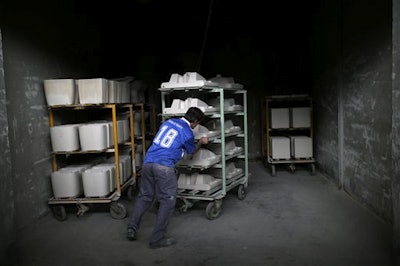
A rusting yellow production line dangles from the ceiling of the cavernous Valadares factory, the long racks of ceramic sinks and toilets whose manufacture once provided jobs for 1,500 people gathering dust in the dim light from high windows.
The Portuguese factory shut down in 2012 amid Europe's financial crisis, its huge debts and outdated business practices dooming it to bankruptcy. Now, on the factory floor some 10 meters (30 feet) below the symbols of the broken past, a few dozen former employees are back at their jobs and fighting to rebuild their lives after the business was reopened by private investors.
Valadares' future is still at the mercy of financial uncertainty in countries using the euro currency, where many businesses are still too worried to invest and hire. But it's a story of recovery that raises some hope for Portugal and the wider region as they try to create much-needed jobs.
European Union leaders meeting for a two-day summit Thursday will try to put into motion a big investment program and find solutions to Greece's financial problems, which are casting a shadow of uncertainty.

"We'll always be wary of what might happen" across Europe, said 41-year-old worker Rui Leitao, who operates the Valadares factory kiln, his clothes smudged with white ceramic powder. "We just have to try our best and show that we're all working together to move Europe on."
The Valadares recovery project showcases two actions that European governments are betting on to help the recovery: simplifying business rules and increasing confidence to encourage private investment.
The factory's re-opening was facilitated by a Portuguese government program to hire the long-term unemployed and from the local council's decision to waive some taxes and cut red tape.
Even among the Valadares factory's new owners, reform has become a mantra. The previous managers, new director-general Henrique Barros says, lost their grip on the company when times were good.
With interest rates low and the Portuguese and Spanish real estate sectors booming, sales were healthy. Workers' wages climbed out of control, and so did their entitlements. Customers were allowed to build up credit to "unsustainable" levels, Barros says.
Then came the 2008 real estate crash, and the Iberian construction sites that accounted for 70 percent of Valadares' sales began to disappear.
Now, Barros says, "the (business) culture is changing."
The new management team keeps a tight rein on costs and customer credit. And the workers have returned — many from the welfare queues — for lower pay.
Also, the company has turned its back on the previous strategy of pile-them-high, sell-them-cheap. The focus now is on innovation, quality and adapting swiftly to market trends, while expansion comes in careful baby steps. A planned training center for apprentices will seek to ensure the company's long-term viability.
The business is leaner, suppler and hungrier, and that, Barros hopes, should help shield Valadares from further eurozone shocks.
Portugal, like Greece, Ireland, and Cyprus, needed an international rescue when the eurozone crisis hit. Its huge debt burden spooked investors who wouldn't lend Portugal any more money.
Following three years of deep spending cuts and steep tax hikes, Portugal is getting back on its feet. The economy grew 0.9 percent last year after three straight years of recession. Unemployment has fallen from a record 17.7 percent in 2013 to 13.3 percent last January.
Portugal isn't out of the woods yet, though. Public debt, at almost 130 percent of gross domestic product, is one of the highest in Europe. The three major international ratings agencies still classify Portuguese government bonds as junk. Company debt in the form of loans, though down from almost 115 billion euros in 2011 to just under 100 billion euros at the end of 2013, are still "excessively high, acting as a brake on investment and job creation," the International Monetary Fund warned in December.
Political stability in Portugal, where no popular radical parties have emerged like Syriza in Greece and Podemos in Spain, has reassured investors, says Antonio Barroso, a London-based analyst with Teneo Intelligence, a political and business risk consulting firm.
However, "weaknesses from an economic standpoint are still there" and Portugal would inevitably feel the consequences of problems elsewhere in the eurozone because the bloc's members are so closely connected, he said.
As a result, the Valdares factory's new owners are being cautious.
The factory has re-hired 45 staff since October's re-opening and hopes to have 140 at work by the year's end. The workers are currently spread thinly in the only functioning factory on the company premises, which cover the equivalent of 18 soccer fields. Almost all the staff is former workers, and most are in their 40s.
When the factory closed, many had families and mortgages and car payments to meet. But at their age it was hard to find work, even though European governments are raising the official retirement age.
Manuel Martins, a 42-year-old who assembles molds, recalls how Valadares was once one of the biggest local employers. Nearby houses set their clocks by the factory siren marking the beginning and end of shifts. The siren is now back.
"When the siren sounded again, it was a joy," said Martins, who lives near his workplace. "I opened the window just to hear it."






















